What is DAO Membership & Why Does It Matter?
DAO membership means an equal seat at the table without a boss. Whether you’re a developer, investor, artist, or just DAO-curious. You have the right to decide, vote, and participate in decision-making without any middlemen. No hierarchy. Just collective decision-making, powered by blockchain.
“Do I Need Cryptocurrency to Join a DAO?.”
Types of DAO Membership
There are three types of DAO memership:
Token based memberesip.
Reputation based menbership.
Open membership
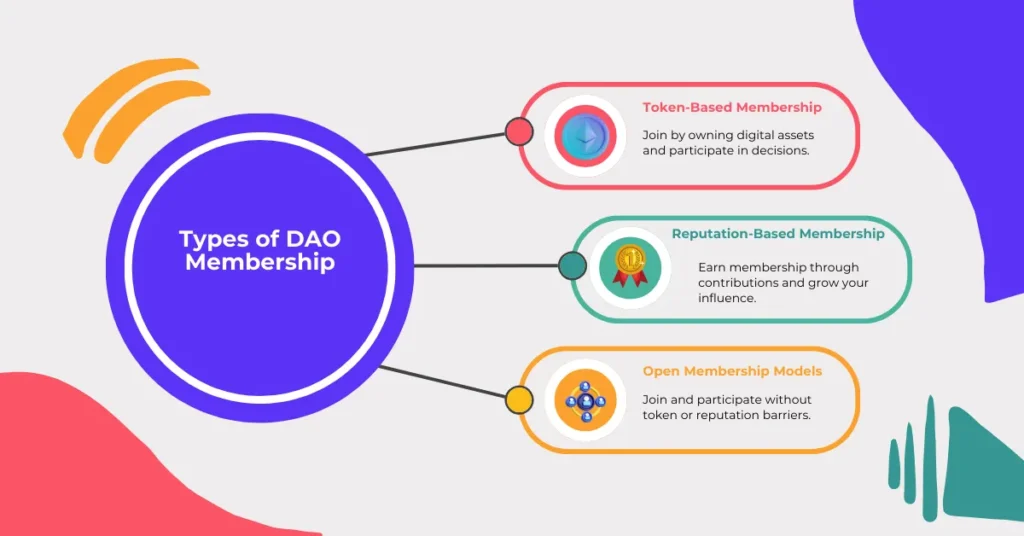
Token-Based Membership
Imagine a club where your membership card is a special digital coin, called a token. To join, you simply own this token. This is token-based membership, and it’s very common in decentralized autonomous organizations (DAOs).
These tokens do two main things:
- They are your membership ID: Holding the token proves you’re a member.
- They give you voting power: The more tokens you own, the more say you get in decisions.
This system encourages people to get involved, as their financial stake (owning tokens) is tied to the organization’s success. However, if tokens are expensive, it can make it harder for everyone to join. Still, this simple, blockchain-friendly approach is very popular.
MakerDAO is a perfect example of this in action.
- Pioneer Project: MakerDAO launched in 2017. It was one of the first big projects in “decentralized finance” (DeFi) and a pioneer in using tokens (specifically MKR tokens) for full control.
- Built on Blockchain: MakerDAO operates entirely on the Ethereum blockchain. This means all MKR token ownership, transfers, and voting records are public and permanently saved.
- Simple Membership: You don’t sign up with a username or password. To be a “member” and have a say, you just buy MKR tokens and store them in your digital wallet.
- How Voting Works: When there’s a decision to be made, MKR owners temporarily “lock” their tokens into a special program called a smart contract. The more MKR tokens you lock, the more powerful your vote is. This direct link between owning tokens and having influence makes you an active part of MakerDAO’s governance and its mission to maintain the stability of its digital currency, DAI.
Beginner-Friendly DAOs to Explore provides a list of communities to get started.
Reputation-Based Membership
That’s reputation-based membership in which influence comes from your helpfulness, good actions, and consistent contributions, not from money or just signing up.
How Reputation Works
You build your reputation by being a genuinely good and active member.
- Earning Your Standing: You get a “reputation score” or “points” by actively participating, finishing tasks, sharing valuable ideas, and helping others. Think of it as earning credit for being a valuable contributor. It’s all about doing things that benefit the whole community.
- Gaining Influence: The higher your reputation score, the more influence you have. This can mean more voting power, access to exclusive areas, or even special recognition and rewards.
- It’s Earned, Not Owned: Your reputation isn’t static; it grows and shrinks. If you stop being active, it will naturally fade over time. Most importantly, you cannot buy, sell, or give away your reputation. It’s a personal achievement, earned directly through your actions.
SourceCred Example
Let’s look at SourceCred. How does this “reputation” actually work in practice?
Imagine a project where people contribute their skills—writing code, designing, and helping others. SourceCred is a smart system that gives these contributors “Cred” (think of it as digital reputation points) for their efforts. It ensures that the people who actively help a project grow are the ones who get a real say in its future. This feels fair and keeps everyone truly involved.
What is SourceCred, really? It’s not a DAO itself, but a powerful tool or special software. It lets DAOs (Decentralized Autonomous Organizations) and other online groups automatically track who’s doing what. This way, they can see who’s being genuinely helpful and reward those valuable contributions. SourceCred essentially provides the “rulebook” for a reputation system that DAOs can plug right into.
Now, while this sounds great, building these reputation systems isn’t always simple. You need clever ways to stop people from trying to cheat or fake their work. But despite the challenges, tools like SourceCred are vital for DAOs that want to reward contribution over just capital.
Open Membership Models
An open membership model is all about welcoming everyone. It’s like a club with an open door. It is a free online subscription. Anyone can join it. But it has a few simple, clear guidelines. Everyone should follow these guidelines.
These simple, straightforward (and non-financial) guidelines are:
- Agreeing to the rules: You have to click “I agree” to the community guidelines or code of conduct.
- Providing basic contact info, like an email address, to create an account.
- Creating a username: Choosing a unique name for yourself.
- Being a certain age: (e.g., 13+ or 18+ for legal reasons).
- Having a shared interest: For example, joining a chess club might require you to say you like chess.
- No background checks: No complex applications or approvals are needed.
An example is Gitcoin. It’s a great example of an open model because anyone can jump in and help fund or build open-source projects. It throws the doors wide open! Open models are ideal. They’re like a brainstorming party for new ideas, and get everyone in the community working together. But sometimes, it can be tough to keep things tidy and make sure everyone sticks to their promises.
Step-by-Step Guide: How to Join a DAO Successfully
Joining a DAO is exciting. You can help govern, work with others, and build cool projects.
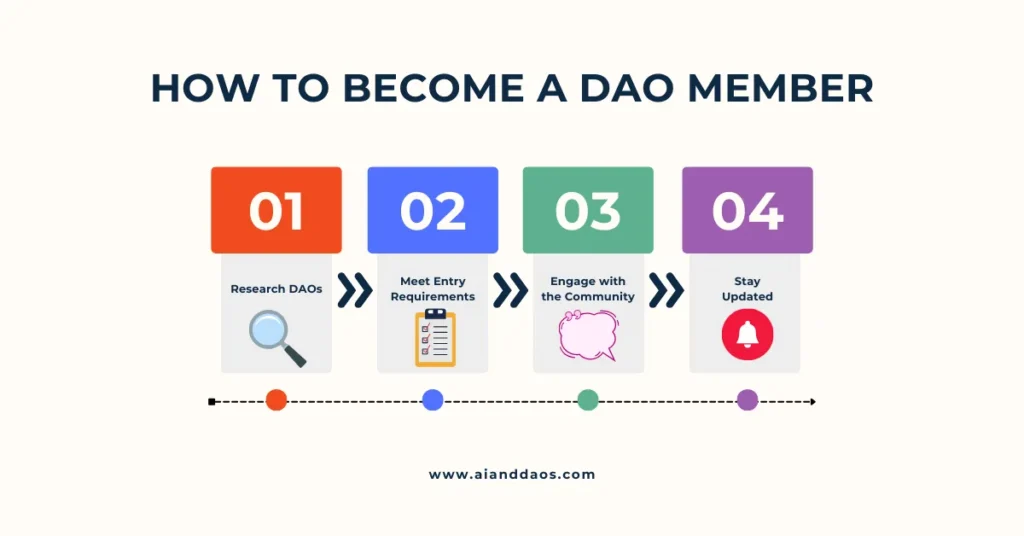
Researching DAOs
To research a DAO, look past the hype. Understand its goal, how it’s run, and it’s right for you or not.
Understand its Mission & Goals
Is it building a product, funding projects, managing a community, or something else?
Does its purpose resonate with you?
Is it token-based (influence by owning tokens), reputation-based (influence by contributing), or open (anyone can join)?
Is it one token, one vote? Are there special roles? How often do votes happen?
Are the rules clear?
How much money does it have? Is its treasury healthy enough to fund its goals?
How are funds managed? Is it transparent? Do members vote on how money is spent?
Is the community active? Check their Discord, Telegram, forums, or Twitter.
How many active members are there?
What’s the general vibe? Is it welcoming, toxic, or inactive?
What blockchain is it on? (e.g., Ethereum, Solana, Polygon).
And much more…
Where to look:
DAO Dashboards/Aggregators: Websites like DeepDAO, Tally.xyz, or Snapshot.org can show you key metrics (treasury, proposals, voters).
Discord, Telegram, Twitter.
DAO’s Official Website
Reading whitepapers or mission statements can provide deeper insights into the DAO’s goals and operations. Choose a DAO that resonates with your skills and long-term objectives.
Engaging with the Community
To get benefit from DAOs you should engage with community, share your ideas, and contribute to ongoing projects. Building relationships within the DAO will enhance your influence and understanding of its ecosystem.
Staying Informed
DAOs are dynamic, with frequent updates on governance, projects, and strategies.
Keeping up-to-date ensures you can make informed decisions and remain an active, valuable member of the DAO.
Want a quick guide to DAO Membership? Download our FREE PDF!
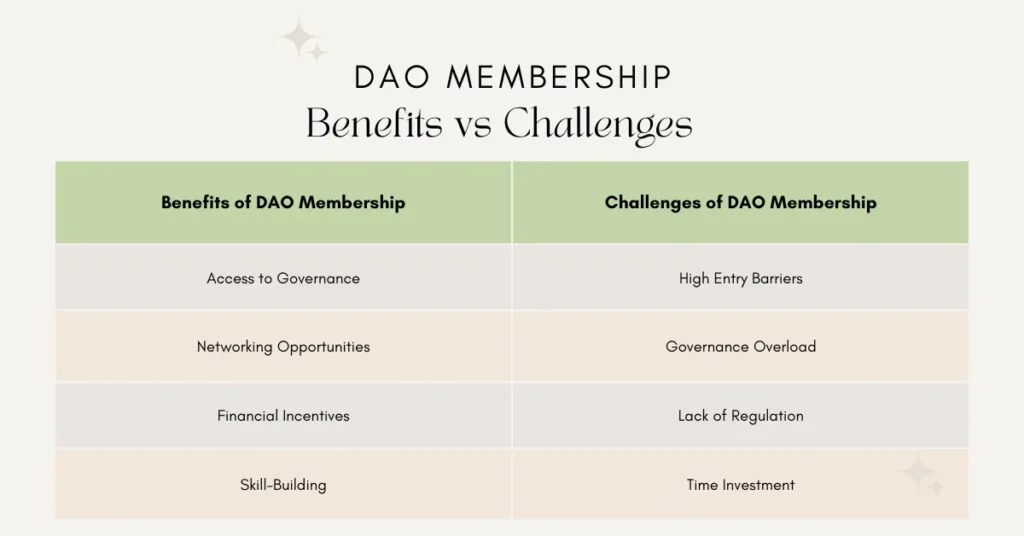
Challenges of DAO Membership
While DAO membership offers numerous benefits, it’s not without its challenges. Understanding these difficulties is crucial for potential members to navigate the landscape effectively.
High Entry Barriers
Governance Overload
Lack of Regulation
The Future of DAO Membership
As decentralized autonomous organizations (DAOs) continue to reshape governance and community engagement, the future of DAO membership is poised for significant evolution. Below are some key trends and predictions shaping the future of DAO participation:
1. Increasing Inclusivity Through Tokenless Models
“Participate in a DAO Without Cryptocurrency”
2. Integration of AI and Automation in Governance Processes
3. Expansion of DAOs into Non-Crypto Industries
4. Predictions from Experts About the Evolution of DAO Membership
Key Insights
Joining a DAO: Your Quick FAQs
1. Do I need cryptocurrency to join a DAO?
Some DAOs require cryptocurrency, but others offer tokenless membership options.
2. What skills are required to be a DAO member?
Skills vary, but basic blockchain knowledge or contributions in areas like marketing or development are valuable.
3. How much time does it take to participate in a DAO?
Time commitment depends on the DAO, but it can range from minimal voting to active project participation.
4. Are DAOs only for blockchain enthusiasts?
No, many DAOs are open to people with diverse skills, including those outside blockchain.
5. Can I contribute to multiple DAOs simultaneously?
Yes, you can contribute to multiple DAOs as long as you manage your time effectively.
DAO Membership Insights: What Industry Experts Say
DAO membership is becoming increasingly recognized as a powerful tool for decentralized governance and community-driven decision-making.
According to blockchain expert Vitalik Buterin,
“DAOs are an important part of the future of decentralized governance. They empower individuals to have a say in decisions that affect them directly, creating more democratic and transparent systems.”
Gavin Wood, co-founder of Ethereum, predicts that’
“In the next five years, we will see DAOs expand beyond the cryptocurrency space into traditional industries like healthcare and education, creating more inclusive and innovative systems.”
Furthermore, Laura Shin, a blockchain journalist, highlights that
“The future of DAOs will be marked by more seamless integration of AI and automation, making governance processes more efficient and accessible to a larger number of people.”
As DAOs grow, it’s clear that their impact on decentralized governance will be profound, and their membership models will continue to evolve, offering even more diverse ways for people to engage and participate.
Check out Beginner-Friendly DAOs to Explore for practical examples.
“Explore Beginner-Friendly DAOs”
Final Thoughts: Should You Join a DAO Today?
We should join the DAO only if we need transparency and fairness. To get maximum benefits from decentralization and blockchain. We should set our goals and purposes and understand the community before diving. Despite potential benefits, DAOs have risks and threats too. To reap maximum benefits, dive into homework and strategic planning.
Look into the DAO’s mission, governance model, treasury, community activity, and security audits. Don’t jump in just because of hype.
How to Join a DAO: A Beginner’s Guide to Decentralized Organizations
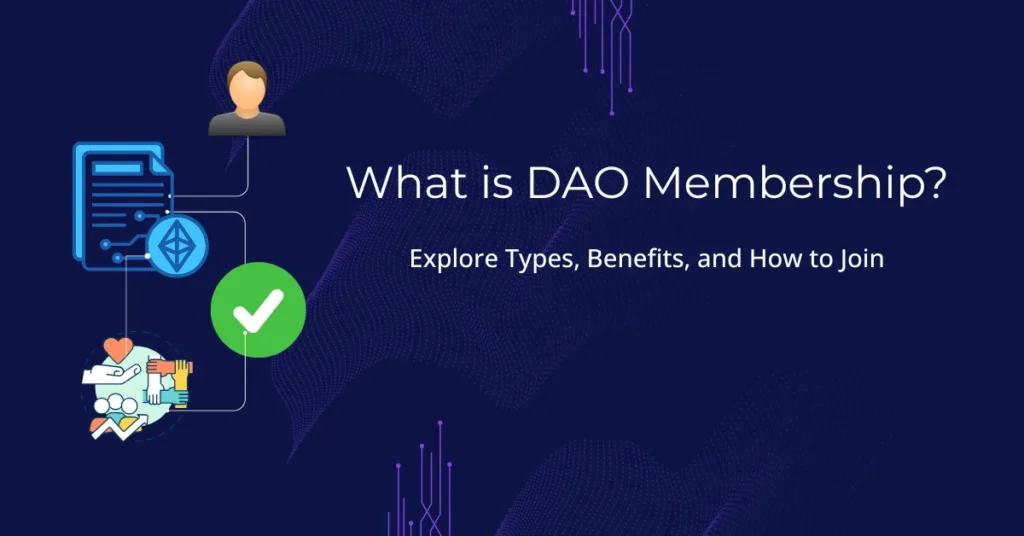
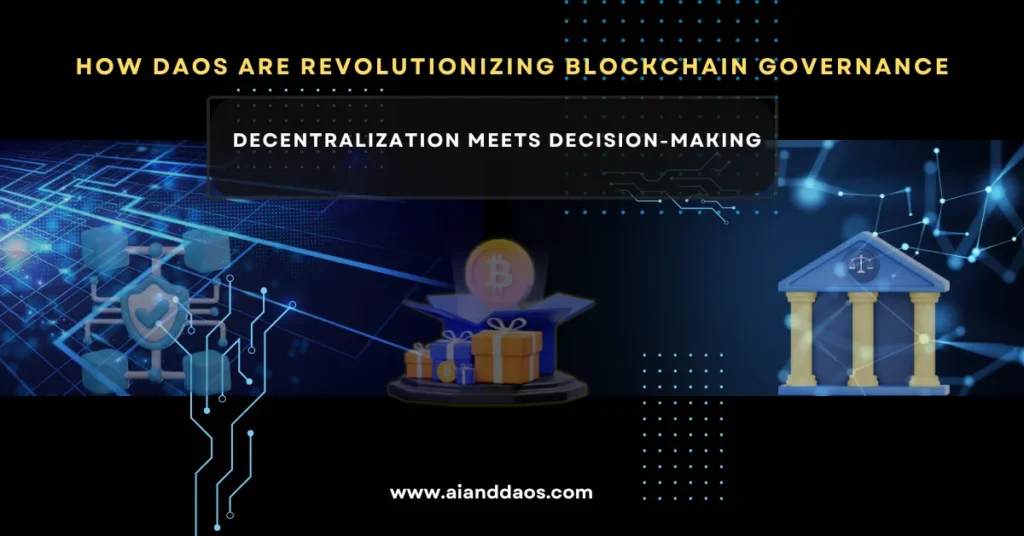
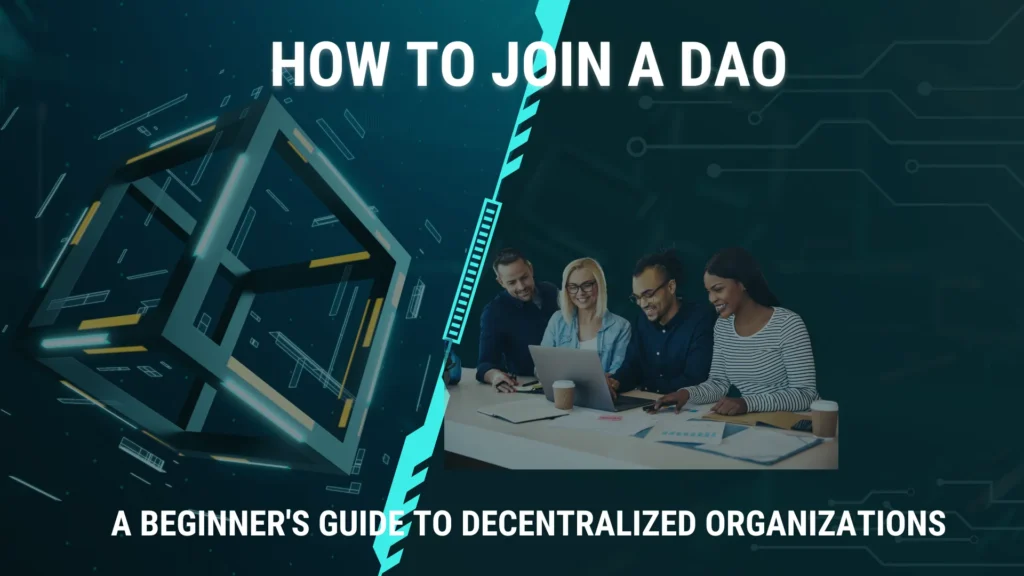
Pingback: Unlock Hidden Wealth: Proven Ways to Earn Tokens in DAOs !
Pingback: How AI in DAOs Revolutionizes Governance: Benefits & Challenges
Pingback: 10 Top DAO Projects to Watch in 2025: Game-Changing Decentralized Organizations Shaping the Future - AI and DAOs
Pingback: How to Join a DAO: Your Ultimate Beginner’s Guide